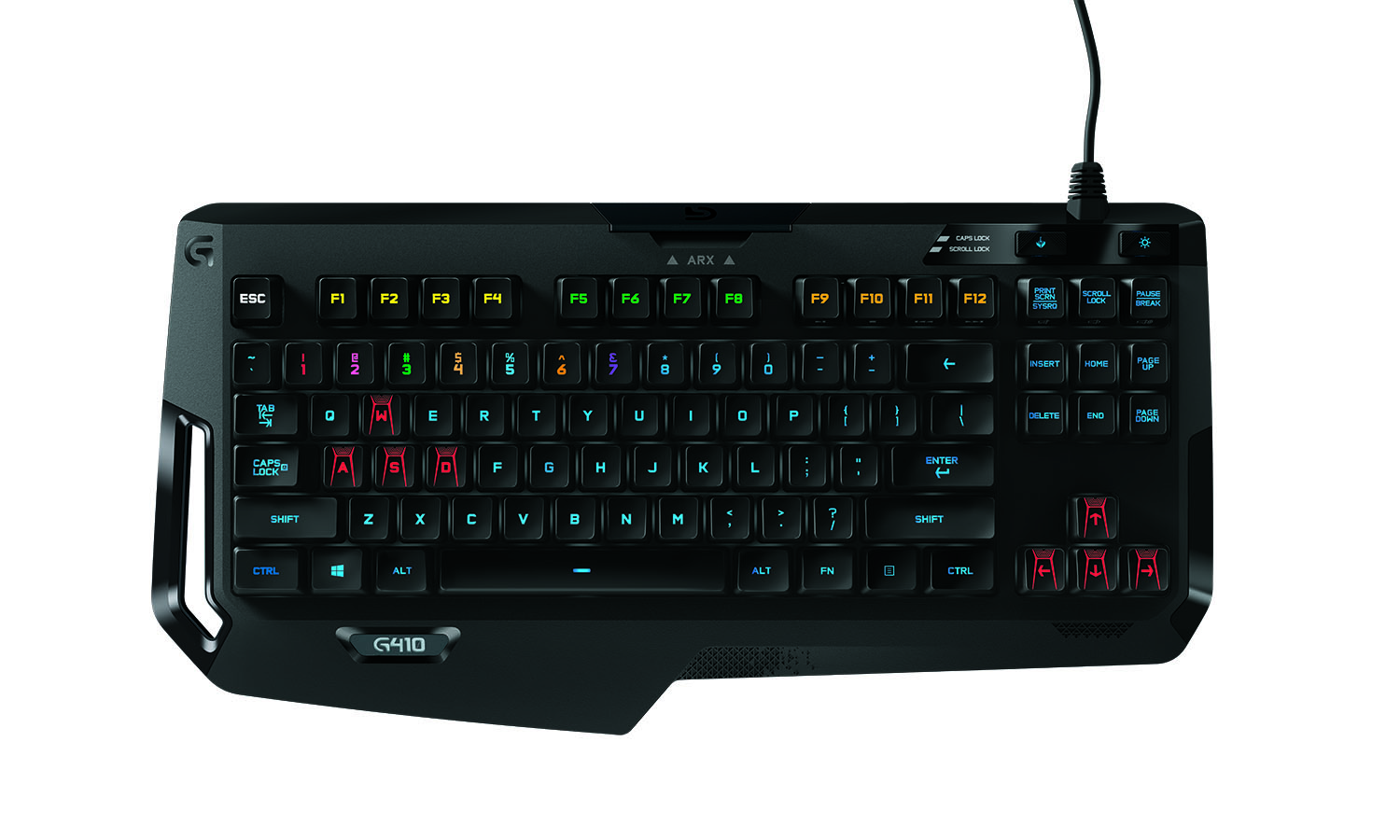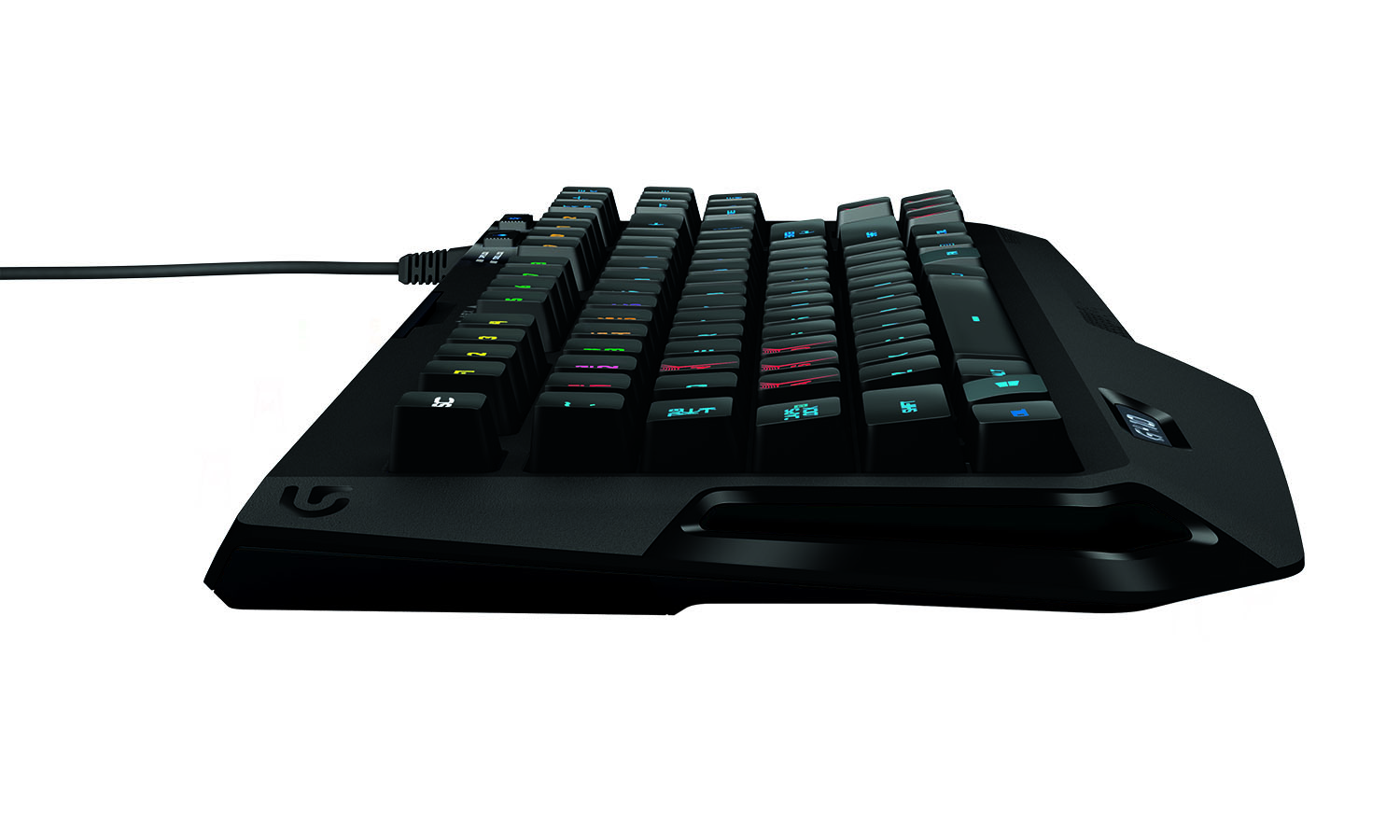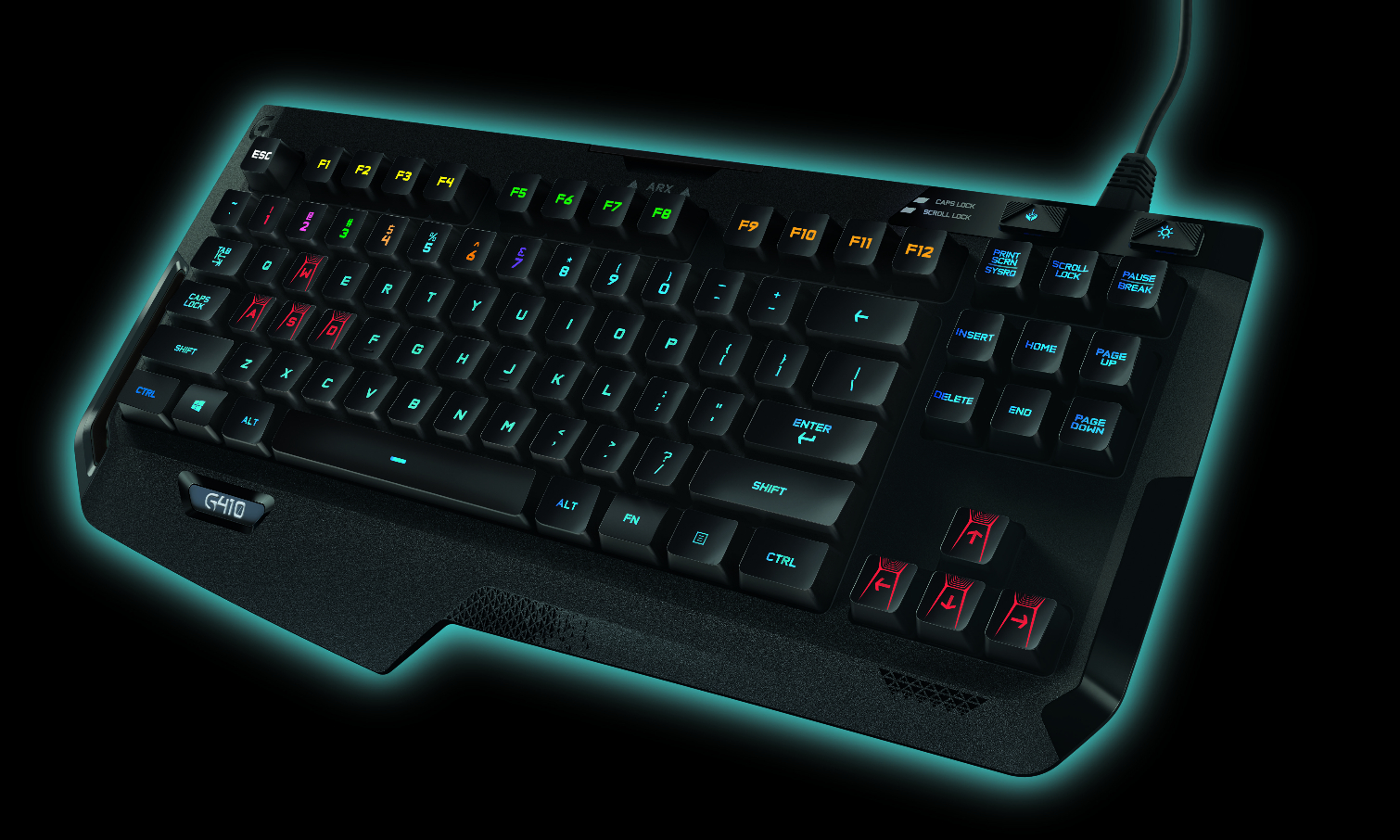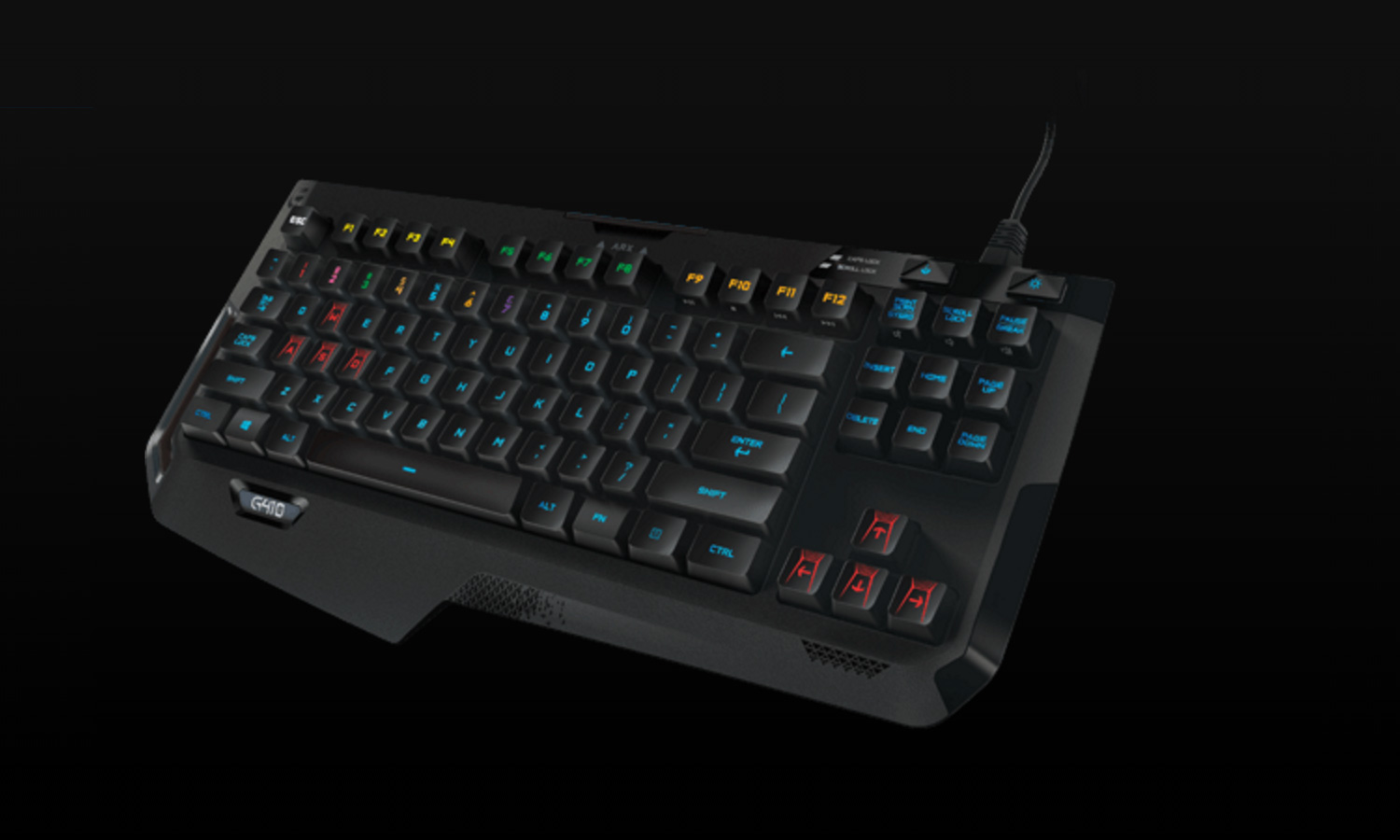Tom's Guide Verdict
The Logitech G410 Atlas Spectrum offers a comfortable design and colorful lighting, but the software needs a little work.
Pros
- +
Striking physical design
- +
Beautiful, colorful backlighting
- +
Small, light and portable.
Cons
- -
Unwieldy software
- -
Key switches feel so-so
- -
Expensive.
Why you can trust Tom's Guide
A few years ago, you could slap some backlighting on a membrane keyboard and call it a gaming peripheral, but tastes change and technology advances. Now, gamers have come to expect mechanical keys and full RGB lighting, even in small, sleek, tenkeyless models. The Logitech G410 Atlas Spectrum ($129) just might hit their sweet spot, offering a comfortable design, colorful lighting and responsive switches. It's a bit expensive, and the software still needs some work. But the Atlas Spectrum is definitely worth buying for those looking to get involved in the tournament scene, or those who just don't have much desk space to spare.
Design
Due to its tenkeyless design, the Atlas Spectrum doesn't consume much space. The keyboard measures 15.4 x 7.3 inches and weighs only 1.83 pounds.
The Atlas Spectrum looks more striking than many of its peers.
That's notably smaller than Logitech's full-size RGB keyboard, the Orion Spark, which is 19.9 x 8.3 inches and 3.30 pounds, but bigger than the tenkeyless CM Storm QuickFire Rapid, which is 14.1 x 5.4 inches and 2.1 pounds. The Atlas Spectrum isn't the tiniest keyboard, but it is one of the lightest.

Eschewing the traditional "black rectangle" tenkeyless keyboard design, the Atlas Spectrum looks more striking than many of its peers. The device boasts an asymmetrical design with an elongated wrist rest on the left side, and a hollowed-out piece of plastic for gripping the keyboard on the bottom left. I'm of two minds about this look. On the one hand, it's a cool, attractive design that helps set this peripheral apart from every other tenkeyless gaming keyboard on the market. On the other hand, it may make this keyboard a bit unwieldy to stash in a bag for travel.
MORE: Best Gaming Keyboards
One large improvement over the Orion Spark is that the Atlas Spectrum features a smartphone stand, and if you elect not to use the stand, it folds into the keyboard fully. The keyboard is compatible with Logitech's Arx Control companion app, which lets you glance at your system's performance on your smartphone screen. Whether or not you want that extra information available at a glance, the hidden stand is a great way to make sure you don't have to give up aesthetics or functionality.
Keys
Like its larger cousin, the Orion Spark, the Atlas Spectrum makes use of Logitech-exclusive Romer-G mechanical switches. For those who haven't heard of these switches before, they're comparable to Cherry MX Brown switches: fairly resistant, but with a soft, quiet touch. Romer-G switches actuate at a distance of 1.5 millimeters and 45 grams of force, whereas Cherry Browns actuate at 2 mm and 45 g of force.
Get instant access to breaking news, the hottest reviews, great deals and helpful tips.

Romer-G switches are slightly faster than their Cherry counterparts (as well as more durable, Logitech claims, although it may take years to see if that holds true). However, in my experience, Romer-Gs aren't quite as satisfying to type with. There's something a little too soft about their touch, and not having the option for loud, clackety keys will surely dissatisfy fans of switches like the Cherry MX Blue or the Razer Green.
My personal preferences aside, the Romer-Gs are competent switches, although they slowed me down a bit during typing. I was able to score 114 words per minute with seven errors on the Atlas Spectrum, but a standard Dell office keyboard gave me 123 words per minute with seven errors. This difference might diminish over time as I get more used to the Atlas Spectrum, but it definitely feels a little more cramped than a full-size keyboard.
Since it is a tenkeyless keyboard, the Atlas Spectrum doesn't have any special extra keys, save for a Game Mode button near the top right. This disables the Windows key during game play by default, so that you don't accidentally exit your heated death match, but you can also use it to block other buttons using the Logitech Gaming Software. It's a handy feature, and its customizability is a great touch that I'm surprised other keyboards haven't yet adopted.
Performance
I tested the Atlas Spectrum with Titanfall, Heart of the Swarm, Batman: Arkham Knight and Star Wars: The Old Republic. Aside from some profile-syncing issues, all four games performed extremely well, I found.
If you want to set up a solid color, a dazzling rainbow pattern or some kind of ocular Lovecraftian horror, the Atlas Spectrum will make your wish come true.
I paid careful attention to Titanfall and Heart of the Swarm, since it's likely that the Atlas Spectrum will appeal to tournament-level players who need to be on the go constantly. I was able to leap around futuristic battlefields in the former and send hordes of Zerg to crush my Terran opponents in the latter, without any issue whatsoever. The Romer-G keys felt clean and responsive, and I appreciated having a little extra desk space to move my mouse around.
MORE: Best Gaming Mice
Arkham Knight and The Old Republic likewise played at the level I would expect from a high-end mechanical keyboard.
Backlighting and Software
Much of the Atlas Spectrum's premium price is likely due to the full RGB backlighting. If you want to set up a solid color, a dazzling rainbow pattern or some kind of ocular Lovecraftian horror in which every key is a wildly different shade, the Atlas Spectrum will make your wish come true.
Logitech has pointed out that unlike other RGB keyboard manufacturers, it illuminates the keys on its keyboards from the center rather than the bottom. This apparently makes a big difference in European and Asian keyboards, although I didn't notice any huge difference in either brightness or consistency between the Atlas Spectrum and competitors like the Razer BlackWidow Chroma or the Corsair Gaming K70.
In theory, the Atlas Spectrum can display 16.8 million different colors, although in practice there's not that much difference between one shade of teal and the next. Even so, this keyboard does a good job of displaying most of the colors I tried. The purples look a bit too blue, but the oranges and yellows, which often throw RGB keyboards for a loop, look great. So it's a fair trade-off.

The backlighting has no serious problems, but it does present a few annoyances, all tied into the software. The Logitech Gaming Software is usually a steadfast and reliable companion for the company's peripherals, but it's a little underwhelming this time around.
One of the most important things you can do with an RGB keyboard is assign different lighting profiles to different games and applications. While you can do that with the Logitech Gaming Software, the function is hard to find, buried behind two tiny arrows that look like a "back" button. There's no way to adjust the universal brightness of the keyboard, either, something that most competitors offer by default.
I also had some trouble getting the profiles to sync with StarCraft II: Heart of the Swarm and Star Wars: Knights of the Old Republic. Andrew Coonrad, a technical marketing manager at Logitech, helped me sort through some of these issues and promised to investigate them further. (The StarCraft issue is fixable by selecting the latest version of the StarCraft EXE; The Old Republic worked for Coonrad, but not for me.) The software will likely receive patches and upgrades in the future, but at the time of writing, it's not quite as intuitive as it could be.
Beyond that, the software lets you block out certain keys for Game Mode, although you can't reprogram individual keys or assign macros — not that you'd really want to, since a tenkeyless peripheral doesn't have many keys to spare.
Bottom Line
While its software still has a few kinks to be ironed out and $130 is an awful lot to ask for a tenkeyless keyboard, the Atlas Spectrum is a high-end peripheral that works just as it's supposed to. It's admirably small and light for those who want to travel with it, and its granular Game Mode features will surely be helpful to those with overzealous fingers and little margin for error. I'm still not convinced that Romer-G keys are up to Cherry MX standards, but they get the job done.
The Atlas Spectrum is well worth buying for those who appreciate portability and gorgeous color options. If neither one of those is a concern, go for either a full-size keyboard like the $180 Logitech G910 Orion Spark or a tenkeyless with only one color, like the $89 Corsair Vengeance K65.

Marshall Honorof was a senior editor for Tom's Guide, overseeing the site's coverage of gaming hardware and software. He comes from a science writing background, having studied paleomammalogy, biological anthropology, and the history of science and technology. After hours, you can find him practicing taekwondo or doing deep dives on classic sci-fi.

